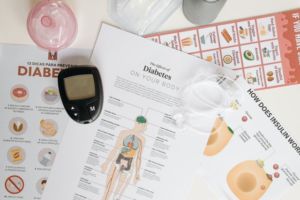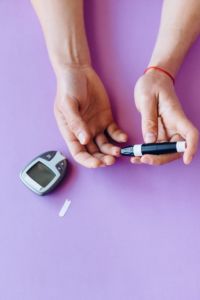Heart disease is the number one cause of death for both men and women in the U.S. People with diabetes are twice as likely to suffer from heart disease or stroke. February is American Heart Health Month. It was established to raise awareness of heart disease and teach people how to prevent it. If you have type 1 or type 2 diabetes, simple lifestyle changes can significantly reduce your risk of heart disease.

The Connection Between Diabetes and Heart Disease
You may already be aware that excess sugar in your bloodstream can damage your eyes and other organs. The same is true for your blood vessels. Excess sugar damages blood vessels throughout your body and can damage the nerves that control your heart. Diabetes also puts a strain on your kidneys. Since your kidneys play an integral role in your cardiovascular system by filtering blood and producing red blood cells, kidney disease increases the risk for cardiovascular disease.
People with diabetes who are also overweight are at an even greater risk for heart disease than those who aren’t. Excess weight strains your heart, and obesity often goes hand in hand with high cholesterol and high blood pressure– two other significant risk factors for heart disease.
Nerve damage from diabetes can make it hard for individuals to know when they have a heart attack. Delayed treatment in these cases often results in poorer outcomes. Everyone with diabetes should be aware of the subtle symptoms of a “silent” heart attack. These include jaw or arm pain, sudden sweating, fatigue, and nausea. Other signs that your heart is not working well include swelling in the legs and feet, dizziness, and feeling palpitations.
Here are the ABC’s of reducing heart disease risk if you have diabetes:

A1c
Managing your blood sugar levels is a crucial part of reducing your risk for heart disease. You’ll also reduce your risk for other debilitating conditions. Work with your doctor to keep your A1c in your target range. Dietary changes, increased physical activity, and stress reduction are all helpful in managing blood sugar. You may also need insulin or other medications. New technology makes it easier than ever for insulin-dependent diabetics to stay on top of their blood sugar levels and take the right amount of insulin at the right time.
If you are overweight, losing as little as 5 to 7% of your body weight can lower your A1c and triglycerides. Physical activity helps you maintain a healthy weight and makes your body more sensitive to insulin. Insulin resistance is a common condition in diabetics that can make it more difficult to manage blood sugar and lose weight through dietary means. Exercising regularly can prevent and improve insulin resistance. Aim for 150 minutes per week of moderate-intensity exercise, like brisk walking.

Blood Pressure
High blood pressure causes your heart to work harder, and it can damage your kidneys. There are no symptoms of high blood pressure until the damage is done, so it’s important to get it checked often. 120/ 80 is considered normal blood pressure. People with conditions like kidney disease, diabetes, or coronary artery disease may not be able to attain normal blood pressure. To prevent serious health problems, the goal for these individuals should be under 130/80. Talk to your doctor about what your blood pressure goals should be and how to get there.
Moderately high blood pressure may be treatable with lifestyle changes like weight loss, increased physical activity, better A1c management, or improved diet. For those with higher numbers, medication may be needed in addition to lifestyle changes.

Cholesterol
The most common form of heart disease among people with diabetes is coronary artery disease, sometimes called ‘clogged’ arteries or hardening of the arteries. Cholesterol is a soft waxy substance that can stick to the inside of blood vessels. This narrows them and makes it so less blood can get through. It also makes it easier for a blood clot to completely block off blood flow, causing a heart attack or stroke.
Hardening of the arteries can happen in any part of the body. When it happens in the extremities, it’s called peripheral artery disease or PAD. PAD is common in diabetics, and it’s often the first noticeable sign of heart disease. PAD symptoms include painful cramping in leg muscles after moderate activity, arm pain while doing manual tasks like knitting or writing, and coldness in the lower leg or foot.
LDL cholesterol sometimes referred to as “bad” cholesterol, is the culprit in coronary artery disease. A simple blood test can tell you if you have high LDL cholesterol. Dietary changes, including avoiding foods high in cholesterol and saturated fat and increasing your fiber intake, can help maintain healthy cholesterol levels. Blood sugar affects cholesterol levels, so keeping your A1c down is an important step in mitigating your risk for high cholesterol.
Increased physical activity and supplements and medications can also help. Many of the natural remedies that are proven to lower cholesterol contain high levels of antioxidants. Increasing your intake of antioxidant-rich fruits and vegetables may help manage cholesterol levels.

Beyond the ABC’s
One of the most important lifestyle changes you can make as a person with diabetes is to stop smoking. Smoking increases everyone’s risk of heart disease, but for diabetics, it doubles the risk.
Stress reduction is an often-overlooked treatment for all the ABCs. Managing your stress with exercise, meditation, relaxing hobbies, or social connections is beneficial for your overall well-being. It can lower blood pressure, help maintain healthy A1c levels and prevent unhealthy habits like smoking or binge drinking.
Chronic unmanaged stress makes your body produce more cortisol. Cortisol is a stress hormone that is helpful in short-term survival scenarios but harmful when it’s elevated over a longer term. Elevated cortisol increases blood pressure, blood sugar and makes it difficult to lose weight. Chronic stress is also associated with poor sleep, which puts an additional strain on your heart and nervous system.
Massage, chiropractic adjustment, and yoga are proven stress relievers that help your nervous system function optimally.
Holistic Healthcare in Tennessee
At Stanlick Chiropractic, we work with patients and their doctors to support their wellness goals. We offer chiropractic care, massage, and lifestyle advice. Schedule a consultation today to see how we can help you live your best life in 2022.

